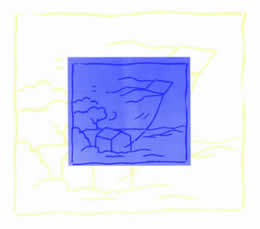"To
Free the Dream"
A Training Course for Parents
by Francesco Stefani
The active involvement of parents in education is a sign of vitality in the family and acceptance of the reality.
The last training course for professionals and parents of blind or low
vision children took place on the 21st of February. It was offered by the
Parents Committee of the Bolognese section of the Italian Blind Union and
organized by Bologna's Istituto Francesco Cavazza with funding by the Fondazione
della Cassa di Risparmio of Bologna for Project C.I.F.R.A. It took place in the
rooms made available by the Quartiere Santo Stefano.
This was an ambitious
initiative to provide answers to an ever-emerging reality in the world of
disability, that is that families, where lives a person with a disability, are
becoming the reference point for rehabilitative and educational interventions
for the disabled person while they, in turn, need to be supported, encouraged
and also specifically trained.
Organized based on this idea, the course
introduced long-time experts working in the field with considerable knowledge and hands-on
experience, and parents who, out of necessity, have sometimes improvised, but
nevertheless have become experts in blindness.
with considerable knowledge and hands-on
experience, and parents who, out of necessity, have sometimes improvised, but
nevertheless have become experts in blindness.
The aspects discussed can be summarized in three main ideas:
-
Reorganizing the relationship and strengths in the couple from the moment when
the child's disability is identified (3 meetings);
- Identifying educational
and rehabilitative intervention strategies for the child (3 meetings);
-
Identifying institutions and associations which are the external reference for
families (4 meetings).
The aspect directly linked to the personal experience
of parents who find themselves discussing their own certainties and acquired
habits when the child's blindness happens, sometimes at birth, sometimes later,
was handled specifically by two psychologists from the Istituto Scientifico
Eugenia Medea with La Nostra Famiglia di Bosisio Parini, and by Salvatore
Lagati from Trento's Consulting Service for Children.
from Trento's Consulting Service for Children.
Eleonora Maino and Onorina
Schiano have presented the results of some research to shed light on the
evolution of the styles of behaviour of a couple experiencing such a
considerable event. They have helped parents relive their own experience,
certainly difficult and painful, but also intensely gratifying and enriching.
They have brought to the fore how the certainty of an initial diagnosis has a
reassuring and calming effect for parents, while on the contrary, an uncertain
diagnosis, suspending between hope of healing and resignation to the
irreversible damage, creates a factor of destabilization and anxiety which often
precludes the possibility of positive and productive reorganization of family
dynamics and interpersonal relationships.
The message is that the hardship
parents are facing can be overcome and the couple's relationship can become
stronger in the end, positioning itself at a higher human level of maturity and
awareness. Without such hardship, this level in the relationship may otherwise
never have been attained.
Nothing, however, is to be taken for granted. If
there is not a more profound dialog and stronger and reciprocal support within
the couple; if there is no openness to the outside world, with other couples who
have experienced the same thing, and with trustworthy and competent
professionals and institutional references, the couple is leaving it up to
insufficient resources and may not be able to cope.
Fears, feelings of guilt,
perceptions of inadequacy, anger, resentment, attempts at self-defence can lead
to denying the problem, entrusting the situation to another person, ultimately
declining any responsibilities and running away from family and child.
In
truth, the couples taking part in the meetings and their own accounts have
confirmed that in most cases, if not all cases, there is a real possibility to
cope with the situation and overcome its difficulties while keeping in mind that
once the very difficult initial impact has been overcome, it is not possible not
to go on. This in fact goes against a second type of risk due to a wearing
effect, continuous stress, tiredness because of overwork, which can lead, if not
kept under control - and the training course has been thought up exactly for
this - to a slow but progressive loss of motivation and energy.
Among the
most effective antidotes to this danger is the natural activity of psychological
prevention, which is done by maintaining good social relationships with other
families. In a more specific and programmed manner, there are those
opportunities of encounters between parents and children together, for example
the week stays in Trento as proposed by Salvatore Lagati. Parents who have taken
part in these have offered extremely positive and convincing accounts.
In
regards to the meetings on activities aimed at the growth and development of the
child's resources, numerous experts, some of them working at the national level,
have taken part in the discussion: Enzo Bizzi, Stephan Von Prondzinski, Marina
Vriz, Riccardo Chiarelli, Roberto Penzo.
The message that they have agreed to
communicate to parents and professionals, also in the specificity of
interventions, is that of a healthy but active realism, which leads one to
clearly realize what could be missing in the child and what there is
available.
Taking into account what comes missing because of total or partial
lack of sight, which entails sometimes ulterior risks, it is fundamental to
understand what part of the child's intellectual, motor and psychological
development is put at risk and therefore what should be done and when, so that
the disability does not affect the person's development.
At the same time, it
is fundamental to recognize the resources available to the child, particularly
so in increasing cases of multi-disability, because through alternative
sensory channels, which primarily are the senses of touch and hearing, can
travel the stimuli and information necessary to building a personality in its
cognitive, emotional, psychomotor and relational aspects.
There are many
tools and techniques available today to enhance and develop the child's natural
resources, but there is still room for creativity by professionals and parents
themselves who, with a positive and constructive attitude, become creators of
products and strategies of effective intervention that are appreciated
by children.
The active involvement of parents in education is a sign of
vitality in the family and acceptance of the reality, different from a too
lenient and protective acceptance of the child. In fact in such case, in the
name of excessive protection and care in regards to the external world, the
necessity for the child to acquire freedom and independence is not understood,
and that is essential during youth and teenage life.
When planning these
phases, one needs to know that the child's healthy relationship with his own
body is of great importance, as are physical, sporting and leisure activities.
Also, the contact with animals can help avoid many problems in relation with
others as well as with self-esteem.
Health and school professionals become,
in this regard, the basic references to children and families because they are
in a position to share knowledge and practice they have gathered in the
blindness field after years of experience and study, often in specialized
institutions in which, incidentally, there is a risk to lose this patrimony of
knowledge and experience because of a lack of continuity among professionals.
It is necessary that specialized training activities be offered to
technicians and professionals so that knowledge transfer among professionals and
particularly families is not improvised or done in a haphazard way.
Unfortunately, it seems from what has been said, and also experienced by
parents, that there is a decline in this professional sector and a lack of
proper replacement for the generation of professionals trained in institutions
for the blind.
This type of issue is linked to those discussed in the last
series of meetings and was lead by representatives of public institutions and
professional organizations: Aldo Costa, Giancarlo Marostica, Enzo Tioli,
Pasquale Marino, Enrica Pietra Lenzi, Walter Baldassari, Mario Barbuto, Egidio
Sosio.
The sometimes courageous and difficult initiatives that have been
brought forth since the '70s, in order to guarantee equal dignity for persons
with disabilities within school and society, have provided significant results
and created general awareness of disability issues, which has even lead to some
results at the legislative level with important laws such as law 104/92.
As
time passes, it has been said that the motivation to update such laws has
weakened and that there has been a climate where little attention and
sensibility is given to those issues. It also seems that the administrative
application of the legal dispositions is lacking and finding obstacles within
the institutions themselves.
Projects and innovations have become rarer in
school environment, there has been stronger requirements for savings on
exclusively economic terms. Some of the structures, which were to take an
interest in disability, have lost sense and active value. A certain detachment
has occurred between institutions, with difficulties in integrating the various
competence and maintaining a dialog and an efficient exchange of information.
There are surveys but without control and significant effects. Some of the
services offered, and supposedly guaranteed, are in fact partially accessible
(Braille books) and volunteer organizations are making a distinction
between themselves, which is certainly not contributing to the general
interest.
Despite these observations, various participants have reported
positive considerations, which makes it worthwhile to pursue what has been
initiated. The legislative framework, however still incomplete, is rich and a
source of guarantee. Some of the proposed organizations, among which the
Istituto Francesco Cavazza, are restructuring and updating their services
according to the new demands. Other organizations who have funding - like the
Foundation which has supported Project C.I.F.R.A. - are keeping an interest in
the field of disability. Bologna's ASL is working on a point of integration for
resources on disability not with an objective of centralization, but of
coordination and development of the different territorial realities. Parents
themselves are growing aware of the role they can and should necessarily play
and they have received attention from the Blind Italian Union at the local as
well as the national level.
From these draft conclusions are emerging some
lines of action for the future, which can be considered the result of a
potentially richer development, stemming from the professional-parent
discussions during the training course "To Free the Dream":
- promotion of
training activities guaranteeing the presence of professional people adequately
prepared to the needs of non-sighted children;
- creation of continuous
opportunities for the different age stages of children in which to have physical
and sporting activities, getting close to nature and animals;
- promotion of
any initiative which requires and entices a better exchange of information,
collaboration and integration between the various institutions and organizations
working in the field of disability;
- activation of forms for mutual support
and self-guardianship of families, also through the support of associations, in
cases in which attribution of services is not done as it should be.